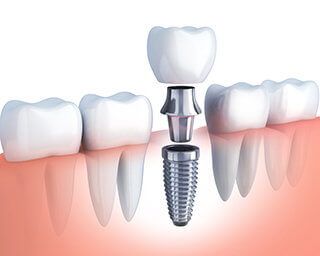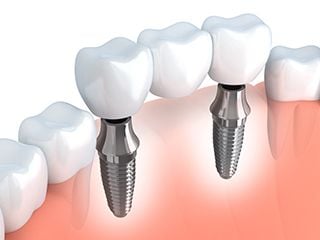Articles
Dental Implants
Articles
- All (27)
- Emergence Care (1)
- Cosmetic & General Dentistry (5)
- Pediatric Dentistry (1)
- Orthodontics (4)
- Oral Health (4)
- Technology (4)
- Endodontics (2)
- Oral Surgery (3)
- Implant Dentistry (3)
- Periodontal Therapy (0)
Dental Implants

If you have recently dealt with an injury or disease that affected your oral health, there are options available to recover the smile you once had. You may even be able to achieve a better smile than the one you had. Dental implants make it possible to renew your smile if you have lost some teeth. There are several options when it comes to dental implants, depending on how many teeth need to be replaced: just one tooth or several teeth in a row.
How do dental implants work?
A dental implant is a metal post, usually made of titanium, which replaces the root portion of a missing tooth. Your dentist will then place a replacement tooth to the post, which can be permanently attached or removable. Permanent replacement teeth are more stable and feel more like natural teeth.
An ideal candidate for dental implants:
- Is a non-smoker
- Has maintained good oral health
- Has healthy gums with no signs of gum disease
Single or Multiple Dental Implants
 Dental implants are very versatile. If you’re missing one tooth, one implant and one replacement tooth will take care of your problem. If you’re missing several teeth in a row, a few strategically placed implants can support a permanent bridge. Similarly, if you have lost all of your teeth, a full bridge or full denture can be permanently fixed in your mouth with a strategic number of implants.
Dental implants are very versatile. If you’re missing one tooth, one implant and one replacement tooth will take care of your problem. If you’re missing several teeth in a row, a few strategically placed implants can support a permanent bridge. Similarly, if you have lost all of your teeth, a full bridge or full denture can be permanently fixed in your mouth with a strategic number of implants.
Dental Implants vs. Dentures and Bridges
Unlike dental implants, bridges and dentures are not fixed to the bone. This can result in them being unstable, making it difficult to eat or smile with the confidence you want. Dental implants look, feel, and act more natural, just like your natural teeth. They also have a stronger biting force. Implants do not rely on neighboring teeth for support, which is definitely an advantage since this means they won’t compromise the health of your surrounding healthy teeth. Implants are also likely to last a lifetime, whereas bridges are only expected to last seven to ten years and even less if a root canal is required.
Taking Care of Your Dental Implants
Your new dental implants should be treated just like natural teeth. They require brushing and flossing at least twice every day and regular checkups and cleanings with your dentist. The better you take care of your implants, the more likely they truly will last you a lifetime.
Articles
- All (27)
- Emergence Care (1)
- Cosmetic & General Dentistry (5)
- Pediatric Dentistry (1)
- Orthodontics (4)
- Oral Health (4)
- Technology (4)
- Endodontics (2)
- Oral Surgery (3)
- Implant Dentistry (3)
- Periodontal Therapy (0)
Recent Articles

Aging and Oral Health
It’s important to take good care of your teeth as you age. Elderly patients ...
26 Feb 2026

About Pediatric Dentistry
Pediatric dentistry is the study, practice, teaching, and research of oral c...
26 Feb 2026

Bone Grafting
The alveolar ridges are thickened ridges of bone on the upper and lower jaws...
26 Feb 2026

Bridges
When you lose a tooth, it affects not just the appearance, but the function ...
26 Feb 2026

Broken Teeth
Even though enamel is the hardest substance in the body, teeth aren’t indest...
26 Feb 2026
Explore Educational Videos about Dental
Educational Dental Videos for You

Options for Replacing missing teeth ?
Ensure the health of your smile with our range of general dentistry services, including exams, cleanings, and fillings.

What is Tooth Decay?
Ensure the health of your smile with our range of general dentistry services, including exams, cleanings, and fillings.
Discover

Transform your smile and improve your oral health at Park Plaza Dental in downtown Petaluma.
©Park Plaza Dental. All Rights Reserved 2026